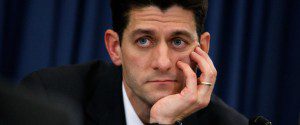
Republican presidential candidate Mitt Romney’s running mate, Rep. Paul Ryan (R-WI) has a vision to make lower-income people in America less dependent on government programs. But, such an outcome would mean a multi-hundred-billion transfer of money from poor to rich.
According to Derek Thompson of The Atlantic:
What does that budget mean for your budget? It rather depends where you fall on the income ladder. Romney is relieving the richest Americans from some of their duties to paying for the risk-protection of the poor, and he is asking some of the poorest Americans to accept less help from the government in exchange for … um, the virtue of independence from government? It is stark, but broadly accurate, to say that the less you benefit from Ryan’s tax cuts, the more you would potentially suffer from Ryan spending cuts. Most of Ryan’s cuts to government — to offset his deep tax cuts for the rich — fall on the back of the poor. He eliminates Obamacare subsidies, cuts spending on CHIP and Medicaid, begins to pare down Medicare, and takes a sixth out of income security. As a result, health care saving and spending as a share of the family budget would almost certainly grow even faster than projected. It is possible — and, in Ryan’s vision, duly wished for — that devolving responsibilities from the federal government to the states and the private sector will drive efficiencies.
Remember when Romney said he’s “not concerned about the very poor” because there’s a safety net for them? Well, there wouldn’t be the same safety net after Ryan’s plan took root. Romney doesn’t have to embrace every detail of Ryan’s plan, and he won’t. But he has embraced the philosophy of Ryan’s vision: That true freedom means freedom from government dependency and the poor are somehow richer, in spirit or in literalness, if they take less money from the government. Ryan believes that his budget could unlock spectacular growth and increase lower-income wages. And it might! But most of what we know about the the impact of technology, emerging markets, and offshoring suggests that gaping inequality is a side-effect of global capitalism more than progressive government. As a result, this budget would have a very predictable outcome: It would make poor families poorer, under the banner of fiscal responsibility.


